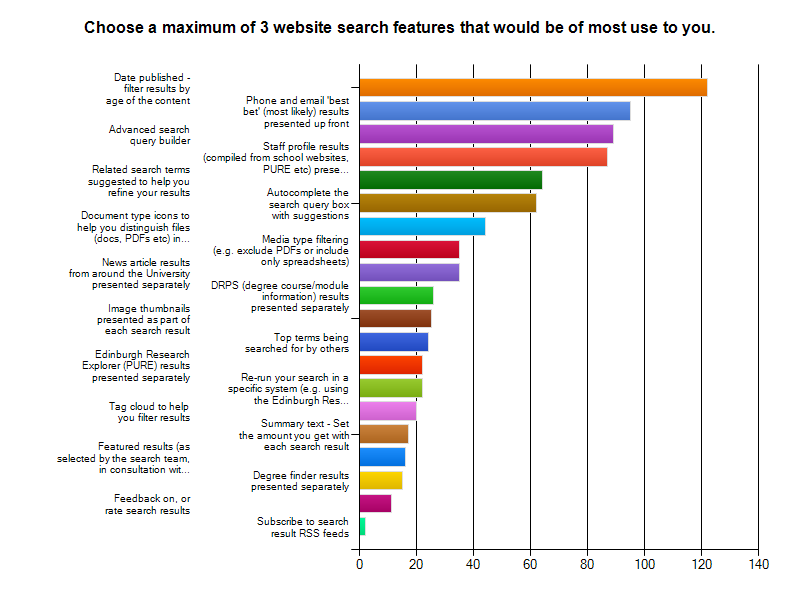Enhancing website search – setting priorities
I presented yesterday on my recent work to identify what University staff would like us to prioritise as we begin to look at enhancing the website search tool. In this post, I’ll cover how and why I did it, and what the Website Programme will be doing with what I discovered.
Our website search runs using the Google service, and has been pretty much the same since an enhancement project in 2012 tidied things up considerably in response to the (then) new privacy and cookies legislation. We made a big step forward at that point, and were also able to offer the service to managers of other University websites not using the central CMS tool we manage.
But we haven’t done an awful lot since then, due mainly to the time and attention we’re giving to the development of our new CMS. I did some work in 2013 with colleagues in IS Applications Division to look at the range of search engine vendors available out there (yes, there are more than just Google!) as a precursor to what we anticipate will be a procurement exercise in the relatively near future.
What we want to do during 2015 is push the technology we have right now as far as we can, and establish whether it’s good enough for our business and website management needs. Gathering information on what website users want from a search, and trying to implement these features will highlight whether procuring a new search tool is required.
Where we want to get to
- We want an enhanced site search tool
- With functionality meeting user priorities
- That is also easy to use
- We want to promote more consistent content management practices
- With transparency about how search works
- We want to push the Google service as far as we can
- To establish whether an alternative provider might better meet our needs
The survey
The survey method I used is one advocated by content management and “top tasks” evangelist, Gerry McGovern, and one that has served me very well over the years.
In a nutshell, we:
- Brainstormed a list of possible site search features, and reviewed other UK HE websites
- Put the list into Surveymonkey and asked participants to pick the top 3 features they’d find most useful
- Shared the survey via University networks to gather responses from:
- Staff – academic
- Staff – support or admin
- Current students
It wasn’t a great time to gather responses (late August into early September) but I was really pleased to get 308. Not a great number of students, but enough staff to be representative: ~60% support and management staff, ~25% academic staff, ~15% students.
We’ll return to the student population in 2015 and repeat the survey to get a better idea of their priorities, but for now we feel we have enough information to confidently begin prioritising and developing.
The results
As is always the case with these surveys, a small number of items are significantly more popular than the rest; what Gerry McGovern and others call the ‘long neck’ and the ‘long tail’.
A few trends and differences
Date filtering was the most important feature for all groups of respondents.
Filtering by staff contact and profile information next most important feature for all staff, but less so for students.
Basic Google-like assistance well rated by all. Features like autocomplete, suggestions of alternative searches, filtering by file type seem to be expected as part of the search experience.
What next?
I’m now handing this information over to Stratos, as it will be his team that decides precisely what to introduce and when. Their job over the course of the autumn is to investigate just how easy or difficult it will be to deliver what people have prioritised.
We’ll end up with a matrix that plots user demand against ease of development and maintenance, and this ultimately will provide us with a search development roadmap for 2015.
I’m really looking forward to see what Stratos, Billy, Alex and Callum decide to focus on, and will be on hand to support them in user interface prototyping and usability research to ensure what you ultimately see on the University website is as useful and user-friendly as possible.
Support with prioritisation surveys
If you’d like to find out more about prioritisation surveys, get in touch with me. We’ve been using them to good effect for years in areas such as:
- Where to focus on improvements to the content management system
- Understanding what target audiences want from a website
- Deciding what web publishers would like to know more about at community sessions
Or you could just read some of the great books and articles produced by Gerry McGovern…
Get in touch – my contact details on the University Website Programme website
A short introduction to Gerry McGovern’s top task analysis, and links to further reading
Presentation on my search survey from the October 2014 Web Publishers Community session



1 replies to “Enhancing website search – setting priorities”